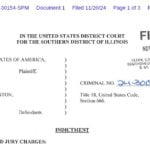DuPage County, IL. (ECWd) –
The Edgar County Watchdogs have Petitioned the 2nd Appellate Court for leave to appeal pursuant to Illinois Supreme Court Rule 306(a)(9) – “from an order of the circuit court denying a motion to dispose under the Citizen Participation Act (735 ILCS 110/1 et seq.)“.
The petition comes from the final order of the circuit court denying a motion to dispose of the suit under the Citizen Participation Act (“CPA”).
In the Petition, we asked for a granting of the petition, to be allowed to file a brief in support of it, reverse the Circuit Court, and require the Circuit Court to grant our CPA Motion.
Read the petition below:
[gview file=”https://edgarcountywatchdogs.com/wp-content/uploads/2016/08/Warchdog-Petition.pdf”]







5 Comments
mark misiorowski
Posted at 20:41h, 01 SeptemberDear Sir/Madam:
Was Edgar County Watchdogs really sued for using the phrase Pay to Play. That term is so vague, it can mean just about anything. That seems pretty clear.
William Safire wrote an article entitled “Pay-to-Play” on March 2, 2009 for the New York Times Magazine. Mr. Safire noted that the term is susceptible to a “multiplicity of ideas” (i.e. some good, some not so good). He also noted that the term “Pay-to-Play” can be used as a noun, a verb, or as a compound adjective. Most certainly, the Watchdogs used the term in a proper and innocent manner, just like Mr. Safire did. So I fail to see why the Watchdogs were sued.
Political commentators in Illinois have also noted that the term “Pay to Play” can be used to compliment an individual for their business acumen or good business sense. See Mr. Bob Scheider’s article of May 9, 2016 entitled: “You call it pay to play, in Illinois we call it good business.” Clearly, the Watchdogs used the term in a positive and innocent manner so they should not have been sued.
Likewise, the US Supreme Court recently noted in the McDonnell decision that the phrase “pay to play” has multiple innocent meanings, but it does not mean that someone committed an illegal act.
Following the Supreme Court’s decision in McDonnell, the broadcast media and the print media have been using the term “pay to play” in virtually every major news story about Ms. Clinton, the Clinton Foundation, and the US State Department. The phrase is used constantly–and legally. You hear it on the radio. You see it on the evening news. You read it in on line news stories. The phrase pay to play has been used literally thousands of times over the past several weeks because the phrase is legal.
It troubles me greatly that major media sources are allowed to use the term in an innocent or neutral manner. It troubles me greatly that major media sources are allowed to use the phrase pay to play consistent with the ruling in the McDonnell decision. It troubles me greatly that major media can use the term Pay to Play without fear of retaliation or fear of getting sued. Yet, when the Watchdogs use the same exact words, they get sued for millions of dollars in damages. Just doesn’t seem fair.
Good Luck Edgar County Watchdogs on your Petition for Leave to Appeal.
Godspeed Mr. Allen.
Joanna
Posted at 11:15h, 06 SeptemberThis is a great analysis Mark. Over Labor Day weekend, I attended a grill-out with work colleagues. Over burgers and brats, part of our conversation drifted to the “pay to play” SLAPP against the ECW. My colleagues all shared your sentiments. One of the things that came out of our conversation was the fact that “pay to play” is not illegal in Illinois: meaning there there is no criminal statute specifically stating that “pay to play” is a crime per se. Murder, for instance, is a crime. If you say that someone murdered someone, that is always saying that the person committed a crime. Theft is always a crime; if you say that someone committed theft then you are saying that person committed a crime. Since “pay to play” is not found in the criminal statutes and is not illegal per se, stating someone engaged in pay to play is not stating that they committed a crime. All of my colleagues agreed that Carla Burkhart and Joshua Feagans were wrong to file their SLAPP and that they will surely lose. We all hope for big sanctions and negative consequences for both Ms. Burkhart and Mr. Feagans to discourage similar SLAPPs in the future.
Danni Smith
Posted at 19:02h, 30 AugustIn order to avoid a slapp suit I did not want to say anything about the Judge’s scale. That this Judge did not dismiss this ranking one scale from feagans is a direct indication of where the Judge may rank. I agree with every single word other than refunds for Burkhart,, However, you prove my point which is, an ethical and knowledgeable attorney does not take a loser case unless he/she is just interested in a fee. It appears, with your affirmation, this is all Burkhart could find and no wonder. I bet my everything that she will see nothing, from ECWD or that attorney.
Joanna
Posted at 09:56h, 30 AugustI wish to be diplomatic here but at the same time truthful. Recently we witnessed the Olympics, where the competitors were judged numerically on their talents (10 being a perfect score in most events, 1 being lowest). Reviewing the documents filed by the attorney representing Ms. Burkhart (an attorney named Joshua Feagans) and the attorney representing ECW, it is appropriate to rate them each on a scale of 1 to 10 based on their work product deliverables. In my opinion, Mr. Feagans comes across like a first year law student (1L) in his writing. His word choices are immature, inflammatory, and I would argue defamatory. If he submitted these documents to his prof in a legal writing class, he would have failed. The ECW documents are mature, persuasive, and professional in contrast. I would rate them at least a 9, even a 10. I struggle to give Mr. Feagans a 1 on a similar scale. In my opinion, Ms. Burkhart should consider a complaint against her own attorney to the ARDC for malpractice. His work product is that poor. Whatever she has paid this buffoon, I am of the opinion that she is entitled to a full refund.
Danni Smith
Posted at 08:53h, 30 AugustUpon reading the series of submissions, I am struck with the difference between the skills in representations. It is dangerous for me to apply any words with implications of the barrister’s respective abilities. Consider my innocent reading of the constructions of the briefs supplied by both sides as this case has proceeded. There are many attorneys who will take any case. I write this with personal experience for both private and business suits, none lost, just aggravation plus fees. The merits of any case pursued is a rising barometer indicating the worth of the attorney. And as frightening as it is, these same attorneys with or without vital inborn critical thinking skills, become judges. Judges in power, deficient as attorneys do not become judicious, once on the bench. The Supreme Court Rule 137 requires every cause of action must be “well grounded in fact”. Yet, this case is so obvious in the lack of comprehension of “fact” by, not the respondents.